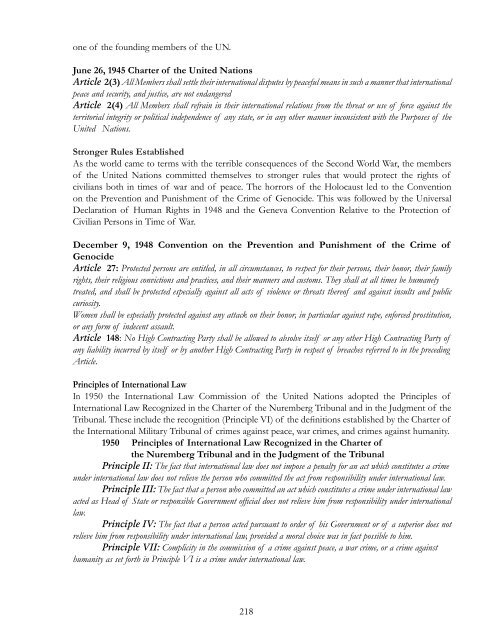Download - Canada ALPHA
Download - Canada ALPHA
Download - Canada ALPHA
Create successful ePaper yourself
Turn your PDF publications into a flip-book with our unique Google optimized e-Paper software.
one of the founding members of the UN.<br />
June 26, 1945 Charter of the United Nations<br />
Article 2(3) All Members shall settle their international disputes by peaceful means in such a manner that international<br />
peace and security, and justice, are not endangered<br />
Article 2(4) All Members shall refrain in their international relations from the threat or use of force against the<br />
territorial integrity or political independence of any state, or in any other manner inconsistent with the Purposes of the<br />
United Nations.<br />
Stronger Rules Established<br />
As the world came to terms with the terrible consequences of the Second World War, the members<br />
of the United Nations committed themselves to stronger rules that would protect the rights of<br />
civilians both in times of war and of peace. The horrors of the Holocaust led to the Convention<br />
on the Prevention and Punishment of the Crime of Genocide. This was followed by the Universal<br />
Declaration of Human Rights in 1948 and the Geneva Convention Relative to the Protection of<br />
Civilian Persons in Time of War.<br />
December 9, 1948 Convention on the Prevention and Punishment of the Crime of<br />
Genocide<br />
Article 27: Protected persons are entitled, in all circumstances, to respect for their persons, their honor, their family<br />
rights, their religious convictions and practices, and their manners and customs. They shall at all times be humanely<br />
treated, and shall be protected especially against all acts of violence or threats thereof and against insults and public<br />
curiosity.<br />
Women shall be especially protected against any attack on their honor, in particular against rape, enforced prostitution,<br />
or any form of indecent assault.<br />
Article 148: No High Contracting Party shall be allowed to absolve itself or any other High Contracting Party of<br />
any liability incurred by itself or by another High Contracting Party in respect of breaches referred to in the preceding<br />
Article.<br />
Principles of International Law<br />
In 1950 the International Law Commission of the United Nations adopted the Principles of<br />
International Law Recognized in the Charter of the Nuremberg Tribunal and in the Judgment of the<br />
Tribunal. These include the recognition (Principle VI) of the defi nitions established by the Charter of<br />
the International Military Tribunal of crimes against peace, war crimes, and crimes against humanity.<br />
1950 Principles of International Law Recognized in the Charter of<br />
the Nuremberg Tribunal and in the Judgment of the Tribunal<br />
Principle II: The fact that international law does not impose a penalty for an act which constitutes a crime<br />
under international law does not relieve the person who committed the act from responsibility under international law.<br />
Principle III: The fact that a person who committed an act which constitutes a crime under international law<br />
acted as Head of State or responsible Government offi cial does not relieve him from responsibility under international<br />
law.<br />
Principle IV: The fact that a person acted pursuant to order of his Government or of a superior does not<br />
relieve him from responsibility under international law, provided a moral choice was in fact possible to him.<br />
Principle VII: Complicity in the commission of a crime against peace, a war crime, or a crime against<br />
humanity as set forth in Principle VI is a crime under international law.<br />
218


